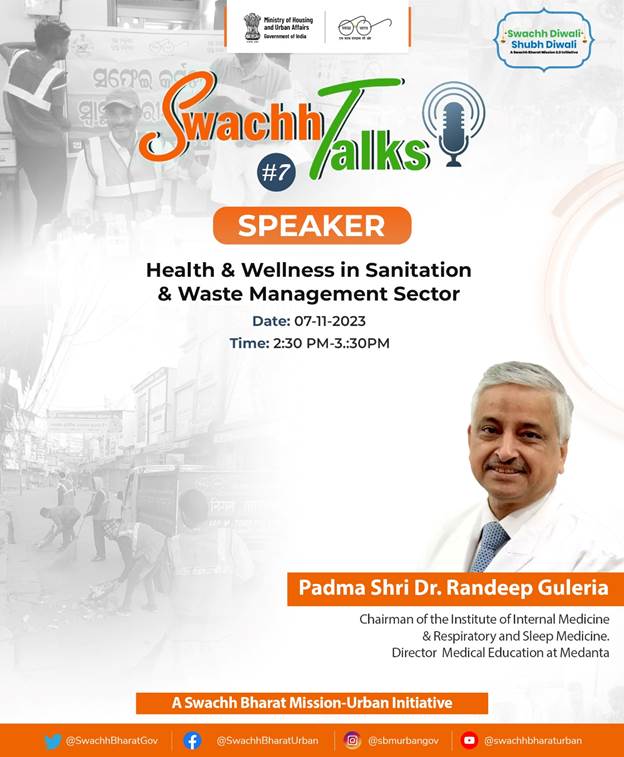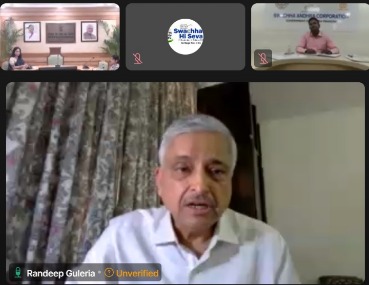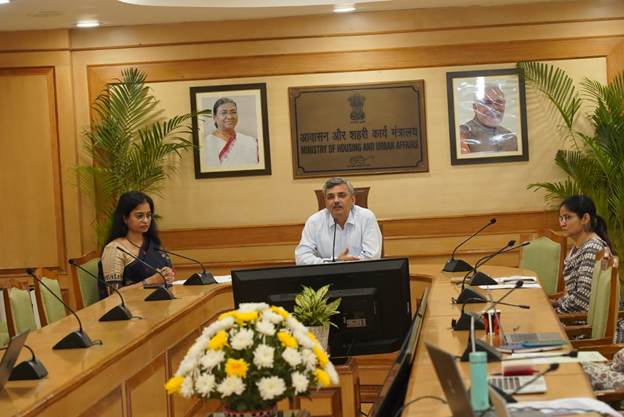7th Edition of Swachh Talks Webinar Series organised to highlight importance of health and wellness in the sanitation sector
The atmosphere is brimming with excitement and celebration as the festive mood sets in. Diwali is being welcomed with great fervour and delight by all, who have adorned their homes, streets, neighbourhoods, and market places with decorations and lighting. This time of the year also highlights the importance of swachhata, not only in households but also in public areas that witness heavy footfall. The citizens are participating in maintaining cleanliness and hygiene in their surroundings, making the festival even more special and meaningful. The onus also comes on the front-liners, who are conducting special cleanliness drives, managing heavy influx of waste and managing the sanitation and waste sector.
Taking forward the journey of Swachhata , the Ministry of Housing and Urban Affairs (MoHUA) launched the Swachh Diwali Shubh Diwali campaign to instil a sense of collective responsibility of celebrating a clean and eco-friendly Diwali, use local products and donate old and unused items in the RRR centres. It also aims to address the health and safety aspect in the sanitation and waste management sector during the festive season The citizens, local bodies, RWAs, Market Associations, SHGs, NGOs, office complexes, schools, institutions should ensure that the street cleaning timings be changed to early mornings when the pollution and the crowd visiting the busy markets and streets is not as much. Misting and water sprinkling activities should be done more often to keep the dust down. Appropriate face masks, protective eye and safety gears should be distributed by the local bodies.

As a part of this campaign and a as a run up to the upcoming festival season, MoHUA organized the 7th edition of the Swachh Talks Webinar Series on the theme of ‘Health & Wellness in Sanitation & Waste Management Sector’. Chaired by Secretary, MoHUA, Shri Manoj Joshi & JS & MD, SBM-U, Ms. Roopa Mishra, the 7th episode highlighted the importance of health and wellness in the sanitation sector. The session was addressed by Padma Shri Dr. Randeep Guleria, Chairman of lnstitute of lnternal Medicine & Respiratory & Sleep Medicine, Director Medical Education at Medanta. Dr. Guleria suggested on SOPs and protocols to be made for the work force to practice and follow while being exposed to the air pollution.

Speaking at the forum, the Padma Shri awardee focused on a need for mitigation action and the need to strengthen the healthcare services. Highlighting the need for immediate measures, Dr. Guleria emphasized curbing the use of firecrackers, occupational health and safety measures like protective eye gears, safety gears, N95 masks, caps, reducing exposure, picking visible waste instead of manual sweeping, pollution abatement for sanitation / outdoor workers. Ms. Bharti Chaturvedi, Founder and Director of Chintan Environmental Research and Action Group, shared the findings of the study ‘Unfair Quality- The lmpact of Air Pollution on Three Occupation’. She highlighted on the possible health impacts of poor air quality on waste pickers, SafaiMitras and Security Guards and discussed the protocols to follow. Padma Shri Dr. Indira Chakraborty, Public Health Specialist, Scholar& Environmentalist, shared her observations on how critical it is to link WASH to food and health. She emphasized on the pollution that results from street food. She highlighted the need to focus on Garbage Management in Food sector and how it is important to streamline health & hygiene.

Speaking on the occasion, Secretary, MoHUA, Shri Manoj Joshi highlighted the need to focus on the SOPs and protocols to be practiced during the alarming air pollution. He mentioned that it is important for the Sanitation workers, especially in the waste management sector to use safety and protective gears. He also highlighted the need for Cities to ensure that the task force exposed to the polluted air is taking preventive measures. The virtual event was attended by State & city officials, sector partners, NGOs working in the sector and representatives of sanitation workers. The Swachh Talks concluded with an interactive session with Cities, wherein they shared their experiences and challenges in health and wellness.

